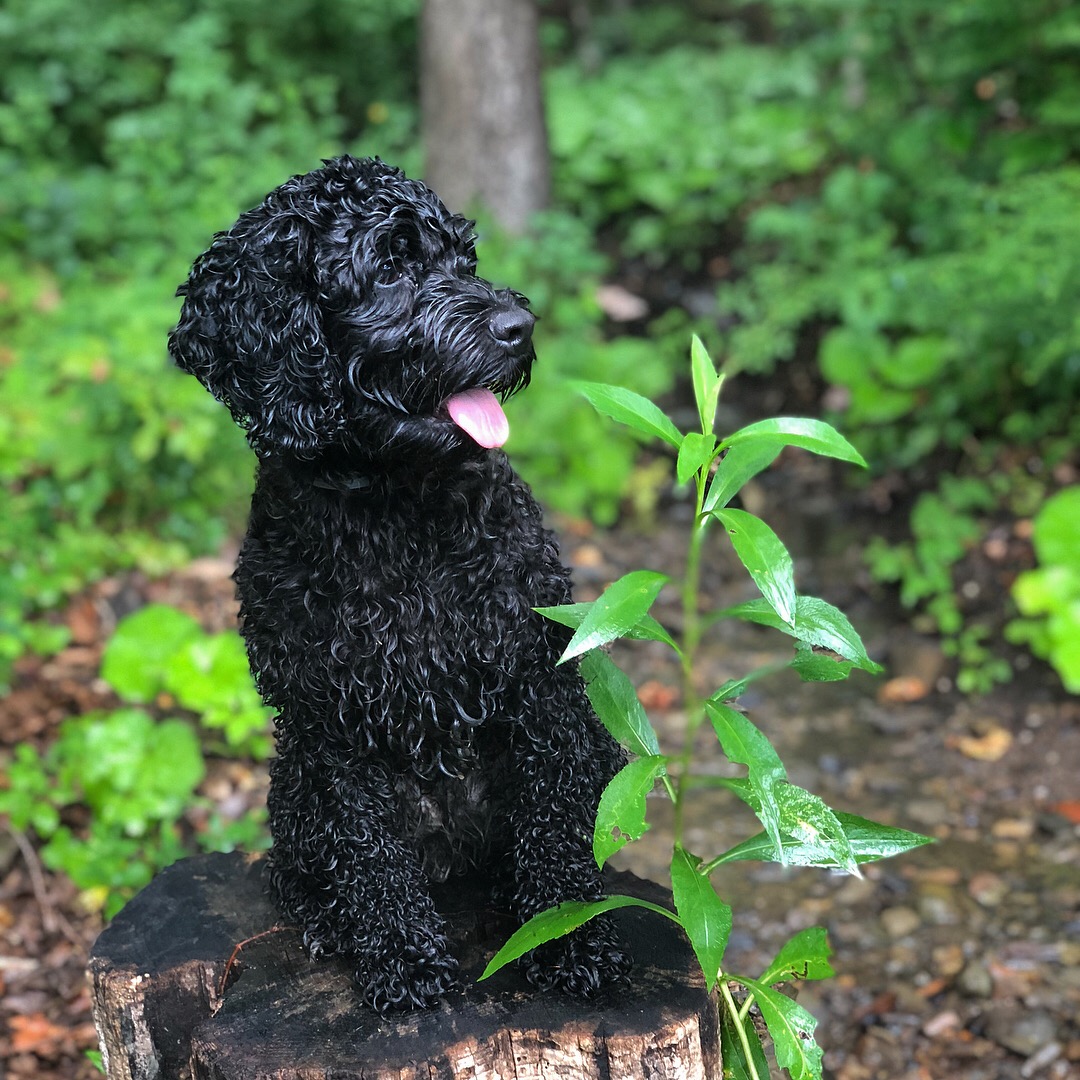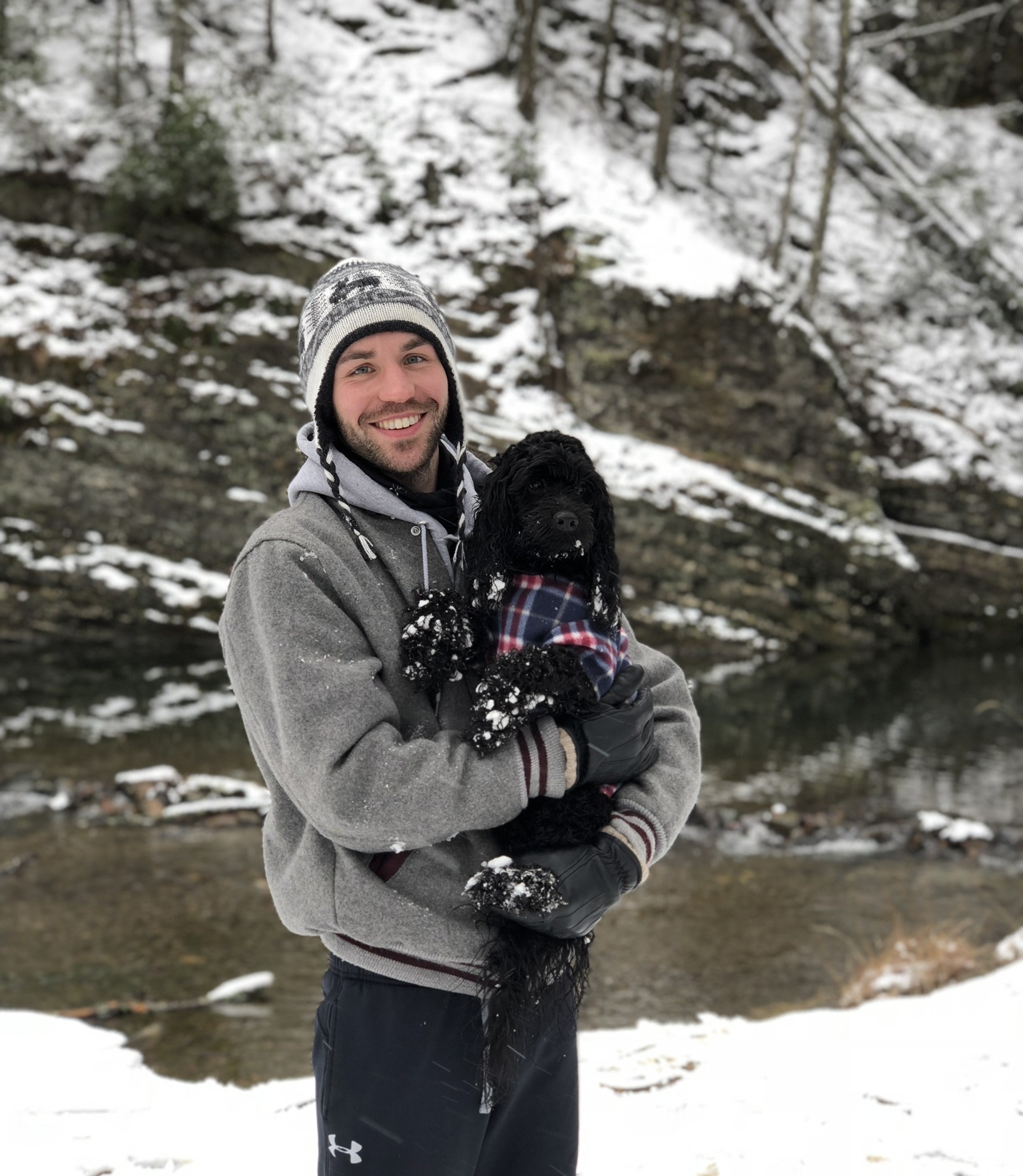General information:
Birthday: March 5, 2017 Color: Black Height: 15”shoulder Weight: 18lbs Size/Breed Type: F1 Standard Cockapoo
Mom: Belle of Savannah, UKC Show Champion, OFA Certified, Tuxedo Black/White Cocker Spaniel
Dad: JoJo AKC registered Cream Miniature Poodle, Certified: OFA Hips, Elbow, Patella, and CERF
Personality: Heavily bonded to me, affectionate, eager to please, cunning, athletic, observant, and very agile.
Genetics: Tested for all genetic diseases attributed to Cockapoos, Cocker Spaniels, and Poodles. OFA Certified (explanation below - in genetics)
About Kona-bear:
Kona was the reason I began to love Cockapoos as a hybrid breed. Prior to Kona, I was in the school of thought that “small dogs” couldn’t participate in the active lifestyle I enjoy so much, but Kona has proven me wrong with every hike, kayaking venture, and rock climbing adventure we’ve taken. Kona is a Standard Cockapoo with her height, reaching 15” at the shoulder and weighing 18lbs. Kona is one of the most athletic dogs that I know, and from a young age she began to display a love for fetch, and a desire to please. Currently, I am hard pressed to find a dog faster than Kona, and at top speeds she is a blur.
Ancestry/Genetics:
Kona’s mother is a Tuxedo (black and white) Cocker Spaniel named Savannah. Her father is a white, Miniature Poodle named JoJo. Kona, as well as both of her parents, have been tested through OFA (Orthopedic Foundation For Animals) to ensure that their patellae, hips, and elbows are all functioning and show no signs of early deterioration. It is important when purchasing hybrids to check with breeders that their dogs are OFA certified, as purebred poodles are predisposed to hip, elbow, and patellar complications. When looking for a proper mate, an OFA certified stud will also be used, to further reduce the chances of less than desirable joint health. has Additionally, blood tests have also been performed to ensure kidney and liver function are ideal. Overall, Kona is a healthy, happy dog, with endurance and speed to match.
Champion Bloodlines Include:
Champion bloodlines include Yerbrier Kit 'N' Kaboodle, Zmora's Hot Shot , Yerbrier Tempest In A Teapot, Cabryn Half and Half, Edryn Yerbrier Sky Hawk, Yerbrier Just for the Fun, Yerbrier Cutting Edge, Yerbrier Rumors in the Wind, Yerbrier Velvet Breeches, San-Gai's Up N' Adam of Danan, Knollkrest Keynote, San-Gai's Lasting Impression
Savannah = Mom
JoJo = Dad
Above, you will see Kona’s genetic panel, certified through Paw Print Genetics. I always recommend this company, as they generally test for not only common diseases, they also test for less common ones, and also have extensive coat color testing.
Kona’s first genetic disease panel was done when she was young as a preliminary test for the “big ones” associated with Cockapoos specifically. I do this first because any of these illnesses are a deal-breaker when finding a quality mating dog. Kona passes with flying colors!!
Above is Kona’s second genetic panel, taken at a later date. As you can see, this panel extends further than just what is tested for cockapoos, and instead includes diseases more specific to poodles and cocker spaniels.
Kona’s results were near-perfect. Actually, they are an “A” by most breed standards, which is still very good. Her results were expected though. She is clear on all diseases again, except for one in which she contains both recessive copies: CDDY with the potential for IVDD. After much discussion with my vet and other breeders, this is actually seen commonly in small dogs, especially hybrids such as cockapoos. However, both Maxine and Kona are not carriers for chondrodysplasia mutations, which give us a better prospect for our puppies.
The reason it’s common? Over time, we’ve selected dogs to be shorter in certain breeds, such as Cocker Spaniels and miniature/toy Poodles. With this comes the negative side effect of CDDY and/or IVDD as we’ve shortened their legs and it alters how the spine is impacted. Essentially, this means they are more susceptible to intervertebral disc issues with age and with high impact activities (jumping/landing from tall heights). While this is unfortunately common in both Cockers and Poodles, it is therefor so in Cockapoos.
Cockapoo and Cocker Spaniel breeders that I have discussed this with have given me the same response : “yup, every time”, because they too have tested and received similar results. When chatting with my vet, they assured me that it isn’t a serious threat to the well-being of our puppies. Apparently, it is nearly impossible to find a Cocker Spaniel, Poodle, or Cockapoo without at least one if not both copies for CDDY, which leaves them open to IVDD.
The solutions? Our studs are selected to complement our girls’ genetic panels, to produce healthy, happy puppies. If we cannot avoid CDDY as many other breeders cannot, we recommend what all other Cocker Spaniel, Poodle, and Cockapoo breeders recommend: don’t over stress their spines with age. Puppies are tough, and my adult Cockapoos still hike and swim regularly with me. I recognize that with age, we will slow this down, and steps/help will require as they mature. Thankfully, that is why I selected Cockapoos to breed. They are easily picked up and handled. It’s simple. Get steps if you have a high bed, and try to reduce high impact jumping and landing as your Cockapoo ages.
Interestingly enough, Maxine does not have two, but only one recessive copy for this mutation. The reason why? Her dad is a standard poodle, and therefore was not short and never had a single recessive copy of this gene, but her Cocker Spaniel mom did. If you are seriously concerned about CDDY, I suggest selecting one of Maxine’s puppies that may be larger in size. Additionally, please discuss any concerns ahead of time with your vet.
As a friendly reminder, we offer a two year health guarantee on all of our puppies. If your puppy displays signs of any genetic disease, and is tested and confirmed by your vet, we too will take the puppy for a veterinary exam and offer a full refund should a third-party vet find the same results. We take the health of our puppies seriously, and any hereditary illness needs to be determined right away for the safety of our continued work and healthy genes. We have had stellar reputations with our puppies and have bred our lines for generations, giving us a great sample size to look at for diseases. When joining our list, you will get a copy of our Purchase Agreement and Health Guarantee which details the aforementioned process in detail.
Extremely low-Shed
Kona’s body type and coat type are more Poodle-like in their features than Cocker Spaniel. She is what we’d expect from a first generation Cockapoo (F1): she is 50/50 for her furnishings (IC locus), and is double recessive for low-shedding gene (sd). One must consider multiple factors when it comes to the shedding, dander, and coat type of a hybrid, so please follow this link to Pawprint Genetics for a detailed explanation! Essentially, Kona’s puppies will inevitably fall within the moderate-low shedding range due to her dominant non-shedding genes and her heterozygous furnishings. Currently, the stud we utilize, Sebastian, is also double factored for non-shedding (sd/sd) and is also F/IC like Kona, suggesting they might have the occasional “smooth” puppy. That being said, even our smooth puppies will still be double dominant for non-shedding, and therefore will likely have a fluffy, but not curly, coat.
Here are Kona’s DNA results for the genotypes we find important as breeders! It helps us understand her offspring’s likelihood of coat color and shedding factor.
Temperament & Intelligence: Kona’s Tests
One of the latest developments in our understanding of a dog’s intelligence has come from Duke University’s Duke Canine Cognition Program. Their center has developed simple yet effective tests to determine a range of intelligence displayed by your dog. With millions of potential outcomes, the tests are designed for us to better understand our companion’s everyday coordination of their world, and their bond with us.
“The Duke Canine Cognition Center (DCCC) is dedicated to the study of dog psychology. Our goal is to understand the flexibility and limitations of dog cognition. In doing so, we gain a window into the mind of animals as well as the evolution of our own species. We can also apply our knowledge of dog cognition to improving programs in which dogs are bred and trained to help humans (e.g., service dogs for the disabled).”
Kona and I performed all of the tests through the DCCC’s citizen science project, Dognition: a collaborative effort of dog owners performing and recording data from their home-tests, then entering their findings into a data set larger than any previously gathered.
The Results:
Kona scored as an Einstein! Out of the five cognitive fields tested on Kona, her memory was topping the charts. Her ability to retain information has made her a real joy to train and explore with. Kona can retain a large amount of information and later utilize it to solve never before seen obstacles. Kona’s mental flexibility has greatly improved our outdoor adventures over time, as well as made training her a breeze!
As athletic and trick-friendly as Kona is, she is an absolute couch potato at home. If she is not out in a field running at full speed, she is wrestling with her sister or sleeping on the couch (preferably on the back, it has the best view).










































